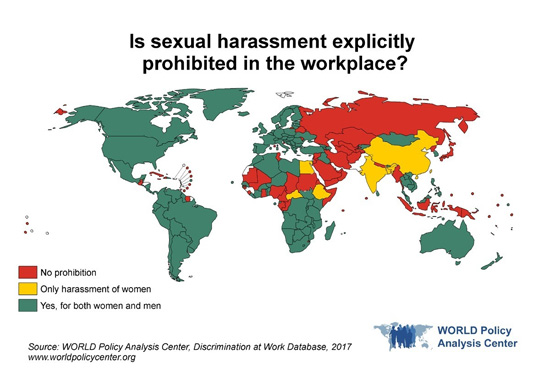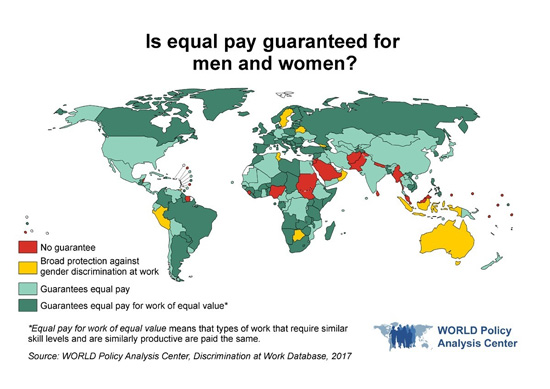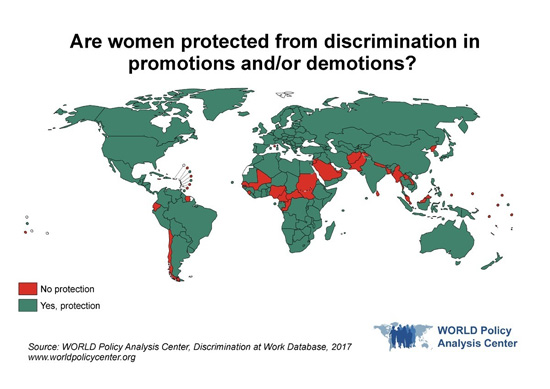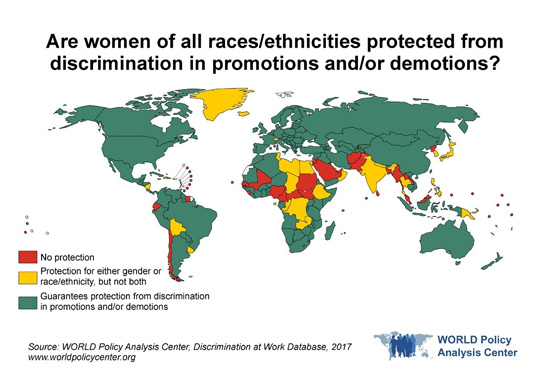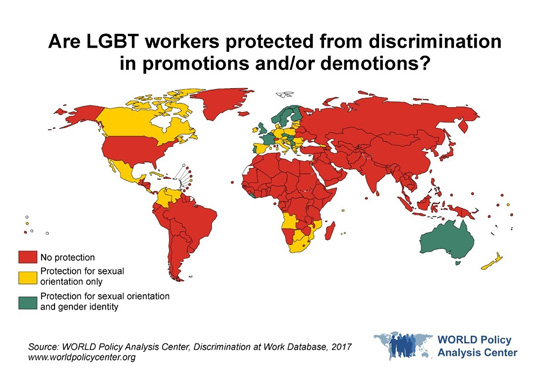NewsNearly 235 Million Women Worldwide Lack Legal Protections From Sexual Harassment at WorkUCLA's WORLD Policy Analysis Center publishes new report examining legal protections against sexual harassment and gender discrimination at work in all 193 UN Member States More than one-third of the world's countries do not have any laws prohibiting sexual harassment at work―leaving nearly 235 million working women without this important protection. Moreover, nearly 82 million working women live in 24 countries that do not have any legal protections against gender-based discrimination in compensation, promotions and/or demotions, or vocational training at work. Globally, women face sexual harassment, discrimination, and inequality in the workplace on the basis of their gender, and also on the basis of age, social class, race/ethnicity, religion, sexual orientation, gender identity, and disability. "Gender discrimination in the workplace adversely affects employees and their families, and impedes the economic success of companies and countries," says Jody Heymann, MD, PhD, founding director of the WORLD Policy Analysis Center (WORLD) and dean of the UCLA Fielding School of Public Health. "And while progress has been made, hundreds of millions of women face discrimination with no recourse, and women in underrepresented groups have the least protections. There are 152 countries that have prohibited discrimination in promotions and/or demotions based on gender, but only 126 countries guarantee protections from discrimination based on both gender and race/ethnicity." To understand whether countries are doing enough to prevent sexual harassment and gender discrimination at work, WORLD performed a comprehensive and systematic analysis of national laws and policies related to sexual harassment and employment discrimination in all 193 countries that are members of the United Nations. The result is WORLD's just-released report, "Preventing Gender-Based Workplace Discrimination and Harassment: New Data on 193 Countries," which provides detailed information on prohibition of sexual harassment at work and protections from discrimination across equal pay, training, promotions, and/or demotions. Preventing sexual harassment and discrimination against women at work—how are the world's countries faring? IS SEXUAL HARASSMENT EXPLICITY PROHIBITED IN THE WORKPLACE?
IS EQUAL PAY GUARANTEED FOR MEN AND WOMEN? • Twenty-five countries do not extend any explicit protection from discrimination in workplace compensation.
ARE WOMEN PROTECTED FROM DISCRIMINATION IN PROMOTIONS AND/OR DEMOTIONS?
ARE WOMEN OF ALL RACES/ETHNICITIES PROTECTED FROM DISCRIMINATION IN PROMOTIONS AND/OR DEMOTIONS? • An additional 28 countries extend protection from workplace discrimination on the basis of gender or race/ethnicity, but not both.
ARE LGBT WORKERS PROTECTED FROM DISCRIMINATION IN PROMOTIONS AND/OR DEMOTIONS? • The vast majority of countries (136) do not take any approach to prohibiting discrimination in promotions and/or demotions on the basis of sexual orientation or gender identity.
Although partial protections from gender-based discrimination and sexual harassment at work are found in a majority of nations, WORLD's findings reveal the need for countries to add and strengthen laws to ensure a safe and supportive work environment for all. "It's critical for all nations to have, and effectively enforce, laws that specifically protect against sexual harassment and discrimination in the workplace," Heymann says. "At the same time, recent events in the U.S. serve as an important reminder that even with laws in place, we will only make enough progress when all people and all institutions contribute to changing norms and practices." Source: UCLA, Health Sciences |

